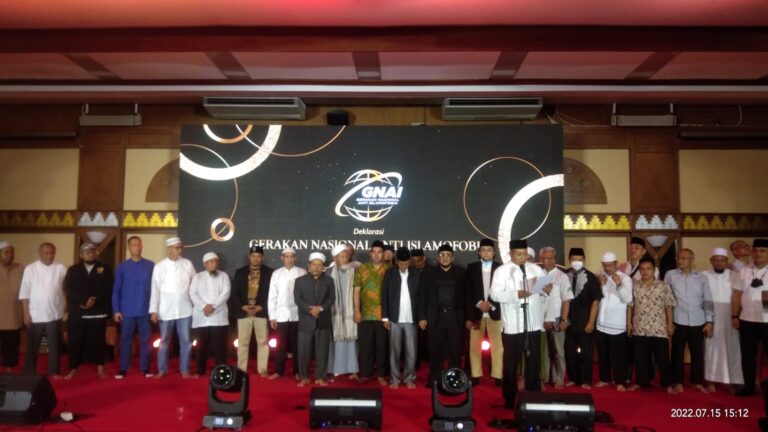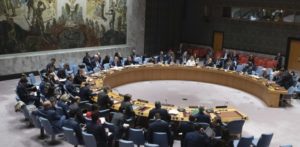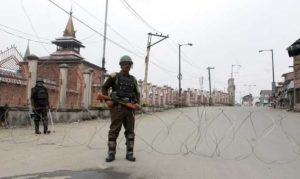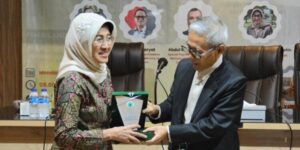Jakarta, MINA – The National islamophobia/">Anti-Islamophobia Movement (GNAI) was declared by a number of figures, scholars, habaib and activists at the Buya Hamka Hall of the Al-Azhar Grand Mosque, Jakarta on Friday 15 July 2022.
In a written statement received by MINA on Monday, this movement is to fight the issue of Islamophobia in the world which western media describes as terrorists and radicals.
This movement is a positive and constructive response to the United Nations Resolution which stipulates March 15 as the International Day to Combat Islamophobia.
The GNAI declaration was attended by a number of figures, namely Deputy Chairman of the Indonesian People’s Consultative Assembly Hidayat Nur Wahid, Chair of the 212 Alumni Brotherhood Slamet Maarif, Secretary General of the PP Syarikat Islam Ferry Juliantono, Deputy Chairman of the Ummat Buni Yani Party, Chairman of the Reborn Masyumi Party Ahmad Yani, Habib Mukhsin, Mustofa Nara, Refly Harun, Alfian Tandjung, Habib Umar Husain and a number of other figures and activists.
Also Read: Be Careful of the Trap of Deploying Peacekeeping Forces to Gaza
Including former member of the DPR RI Hatta Taliwang, former DPR member Ariadi Ahmad, Rizal Fadilah, Anton, activist of the 98th era Andrianto. Meanwhile, in the ranks of the initiators and founders of GNAI, there are the Deputy Chairperson of the Indonesian Ulema Council (MUI) Buya Anwar Abbas, Secretary General of the PP Syarikat Islam Ferry Juliantono, grandson of the founder of Nahdlatul Ulama KH. Wahab Hasbullah namely Gus Aam, Ahmad Dhani Prasetyo, Habib Mukhsin, Ustadz Umar Husein, Ustaz Alfian Tandjung.
Agenda for the battle against Islamophobia
In addition, a number of figures also gave testimonies through videos that were shown at the location of the event, including Ustadz Abdul Somad (UAS) and General Chairperson of the PP Syarikat Islam Hamdan Zoelva.
The declaration and statement of the position of the National islamophobia/">Anti-Islamophobia Movement (GNAI) were read by the Presidium of GNAI Ferry Juliantono.
Also Read: The Forty-Four-Days of Glory: Azerbaijan’s Struggle for Justice and Peace
Ferry said, after the cold war era, the Western world shifted the source of threats and dangers from communism to Islam which was manifested in the form of radicalism, fundamentalism and terrorism, which resulted in the emergence of a stigma against Islamic teachings as dangerous and frightening teachings or known as Islamophobia.
History shows that this stigma has finally created deep hatred for Islam in various parts of the world.
Theological differences that are exacerbated by political, economic, and cultural differences often lead to tensions and conflicts between countries. However, after decades of going on without scientific evidence, finally a new awareness emerged that the source of the world’s threats stemming from the teachings of Islam was not true, unproductive, and even destructive to international relations.
The five attitudes and demands of the GNAI as part of the Declaration, namely first, that March 15 every year be commemorated as the day of resistance against Islamophobia. Second, so that the government does not make Islam and Muslims as problems or opponents but potentials and partners for the development of the nation and state.
Also Read: Palestine Solidarity Month: A Collective Movement for Al-Aqsa and Palestine’s Freedom
Third, stop the radical, intolerant and anti-diversity stigma aimed at Muslims. Fourth, do not direct religious moderation to the meaning of secularization, liberalization or value development (plotism). Fifth, urge the Government and the House of Representatives to issue an islamophobia/">Anti-Islamophobia Law with strict and harsh sanctions for violations.
The GNAI declaration to follow up on the UN Resolution was deemed appropriate, especially since Indonesia is a Muslim-majority country. The irony is that in a Muslim-majority country, Islamophobia is rife. A government that allows and even actively participates in creating an Islamophobic climate is certainly not healthy.
Islamophobia has various forms such as blasphemy, accusations of slander of radical and intolerant Muslims, de-radicalization programs that are essentially de-Islamizing and even de-Qur’anizing, criminalizing Islamic clerics and activists, as well as the development of heretical ideas including nativism by clashing religion with Islam. custom/culture.
islamophobia/">Anti-Islamophobia is on the move. Remind the nation, especially the government, to realign the direction of religious politics in Indonesia. Religion is potential and strength, not an obstacle to development or progress. Gathering with various groups of people became an important agenda of the movement.
Also Read: Hassan al-Turabi: A Controversial Thinker from Sudan
In the Declaration, the islamophobia/">Anti-Islamophobia Law urges to be issued immediately so that Muslims are more secure in carrying out their religious activities and are protected from attacks and disturbances from various parties who want to damage the life of the nation and state.
Muslims are people who obey the law, therefore the aspirations of the people must be accommodated in the legislation.
The UN Resolution-based Anti Islamophobia Movement is therefore global in its nuances. Alliances with similar movements in various countries should be built. The goal is that Muslims can contribute more in creating world peace. It’s time for people to move faster.
The islamophobia/">Anti-Islamophobia Movement is a movement to unite the people and at the same time prevent divisions due to fighting and slander from groups that hate or fear Islam too much.
Also Read: Who Exactly is the RSF Group Shaking Sudan?
The National islamophobia/">Anti-Islamophobia Movement (GNAI) has been declared at the Al Azhar Grand Mosque in the Buya Hamka Room. Reminds the spirit of Buya Hamka who is persistent in upholding truth and justice. Defending the religion of Islam through da’wah. (T/RE1)
Mi’raj News Agency (MINA)
Also Read: The Two-State Solution (Palestine–Israel) in Historical Perspective


















![French President Emmanuel Macron in Berlin, Germany on March 15, 2024 [Halil Sağırkaya – Anadolu Agency]](https://en.minanews.net/wp-content/uploads/2024/10/Screenshot_2024-10-22-20-57-45-59_40deb401b9ffe8e1df2f1cc5ba480b12-300x193.jpg)
















 Mina Indonesia
Mina Indonesia Mina Arabic
Mina Arabic